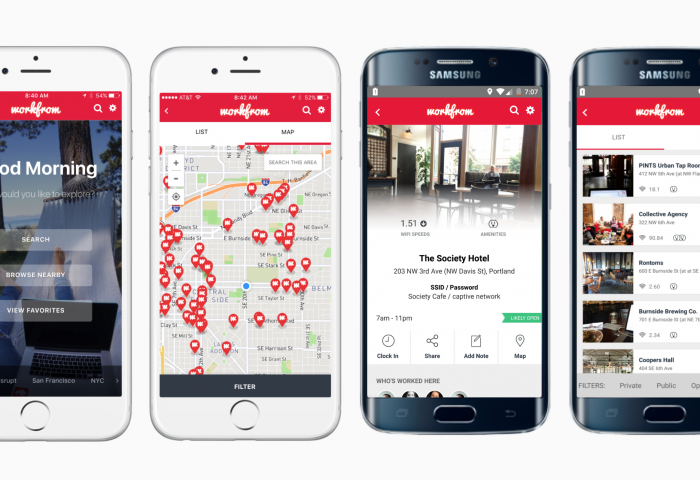It’s a familiar experience for the millions spending time enjoying local coffee shops and cafes. Amidst the sounds of espresso machines, general chatter and ‘90s R&B are the conversations about a new business venture, an upcoming product launch, the right UI design for an app and the overhauled marketing strategy. If you live near a university, it’s the conversation happening with a group of three students comparing notes. Textbooks, notebooks and MacBooks.
Close your eyes a moment and imagine you are there. Look around the space. See all those glowing tech gadgets? See them now?
If you’re there with me right now, you’ll see people with their laptops open and headphone cables dangling from their ears. Those are my people; they’re building the things they love, pursuing their personal development, and honing the critical skills that will propel them forward in their businesses and careers.
Some of these folks work as community managers and software developers. Some are designers, social media mavens and project leads. Others are regional sales directors for Constant Contact, Yelp, Whole Foods and UnitedHealth.

About this photo: Taken on a workday at The Abbey Coffee Art and Music, Santa Cruz, CA
See the woman near the window, sitting just a bit too far away to make out what the decals on her MacBook Air say? She’s building an iOS app with her Berlin-based team. Seated to her right (with the blue baseball cap) is a local entrepreneur researching the best payroll software for his growing team of five, soon to be eight. And different versions of this scene are playing out in coffeehouses all over the world.
in·cu·ba·tor
noun
- a place, especially with support staff and equipment, made available at a reduced rent to new small businesses.
Today’s community coffeehouses represent increasingly valuable workspace for a new and much more mobile generation of professionals, students and entrepreneurs. These spaces are natural incubators for great ideas. When you pull back to a 60,000-foot level and view these places as part of a larger network, you and I are both looking at the most significant amount of readily available and affordable square footage that actively supports millions of people participating in the world’s fourth industrial revolution.
Coffee shops and cafes have become the unsung incubators for the next-generation workforce.
This patchwork of community-minded businesses now provides valuable space, amenities and ambiance for the increasing amount of people who choose to work from these venues each day.
Your local coffee shop and neighborhood cafe is a rarely celebrated champion in the future of work. We see it at Workfrom and why our mission to spotlight work-friendly spaces across the planet is key to supporting how the world of work is changing. Now and in the future.
Digital natives are shifting the workforce paradigm.
People entering the workforce today are native freelancers, entrepreneurs, and remote workers. As part of an inherently tech-savvy generation that’s heavily connected by social media, they’ve come of age in a world where the opportunity to build a career or business from wherever you happen to be is real.
Through everyday activities with their peers and by interfacing with the world around them, they’ve developed marketable skills that can be leveraged to allow them to live and work from anywhere they choose.
In large numbers, more seasoned professionals and even entire organizations are ditching the office, the daily commute and the nine-to-five bookends for opportunities to work on their own terms.
They’re choosing to craft their work around their lives and not the other way around.
They’re shedding the constraints of being tethered to a single location when trying to do their best work and hire top talent.
They’re making a personal and cultural promise.
Breaking free from work norms of the past is a promise to value outcomes over outputs (butts in seats be damned). A pact to pursue location independence over geographical roots. Serendipity over certainty, and reliance on personal technology versus in-office resources.
In the late 1970s, ‘80s and even throughout the ‘90s, as the tech bubble went from its nascent stages to a huge boom, the family garage was the perfect hub for the early days of what we now call startups.
Entrepreneurs are still dreaming, scheming and building new and exciting stuff. But they’re not hanging out in garages anymore. Today they’re gathering and working from coffee shops, cafes, bars, restaurants and coworking spaces.
As founder of Workfrom, I’ve been privy to story after story of great companies and careers being launched from these work-friendly spaces.
Many of my peers have talked about the important role coffee shops and cafes have played in their company’s history; often seeing them with an ongoing role to play.
Thriving startups like ProductHunt were born in these places. Founder Ryan Hoover said: “I find it difficult to work from home, so before we had an office I visited Philz nearly every morning. I still work from there the first few hours of every day. The environment is friendly and provides a great way to experience different scenery throughout the day. Of course, the coffee’s great, too.”
And my friend Joel Gascoigne, founder of Buffer, recently shared insights with me on Twitter about his company’s beginnings.

The Future of Work depends on you.
Coffee shops, bars, cafes, restaurants, and other spaces offering reliable Wifi, a steady supply of caffeine, snacks, power for our devices, and a social ambiance to cure our cabin fever have organically become our coworking spaces and idea incubators of choice.
The vast majority of these businesses are entirely reliant upon food and beverage sales. So support them with your dollars and your evangelism. Buy more coffee. Drink more tea. Get that croissant.
Bring your friends, coworkers and clients in for a visit whenever possible. Say thank you to the staff, and offer to help fix that router issue causing the WiFi to drop intermittently (you know why).
We need these spaces and they need us. We’re building the next big thing from inside the doors they’ve worked hard to open—and keep open.
I’m excited for an opportunity to celebrate and support the important role our unsung incubators play in the future of work. I believe it’s one of the most vital roles in our fast evolving work-from-anywhere world. As we grow and continue to break down barriers of the past, we need to think about how we engage with, reuse and repurpose the spaces around us.
Help me sing their song.



Responses